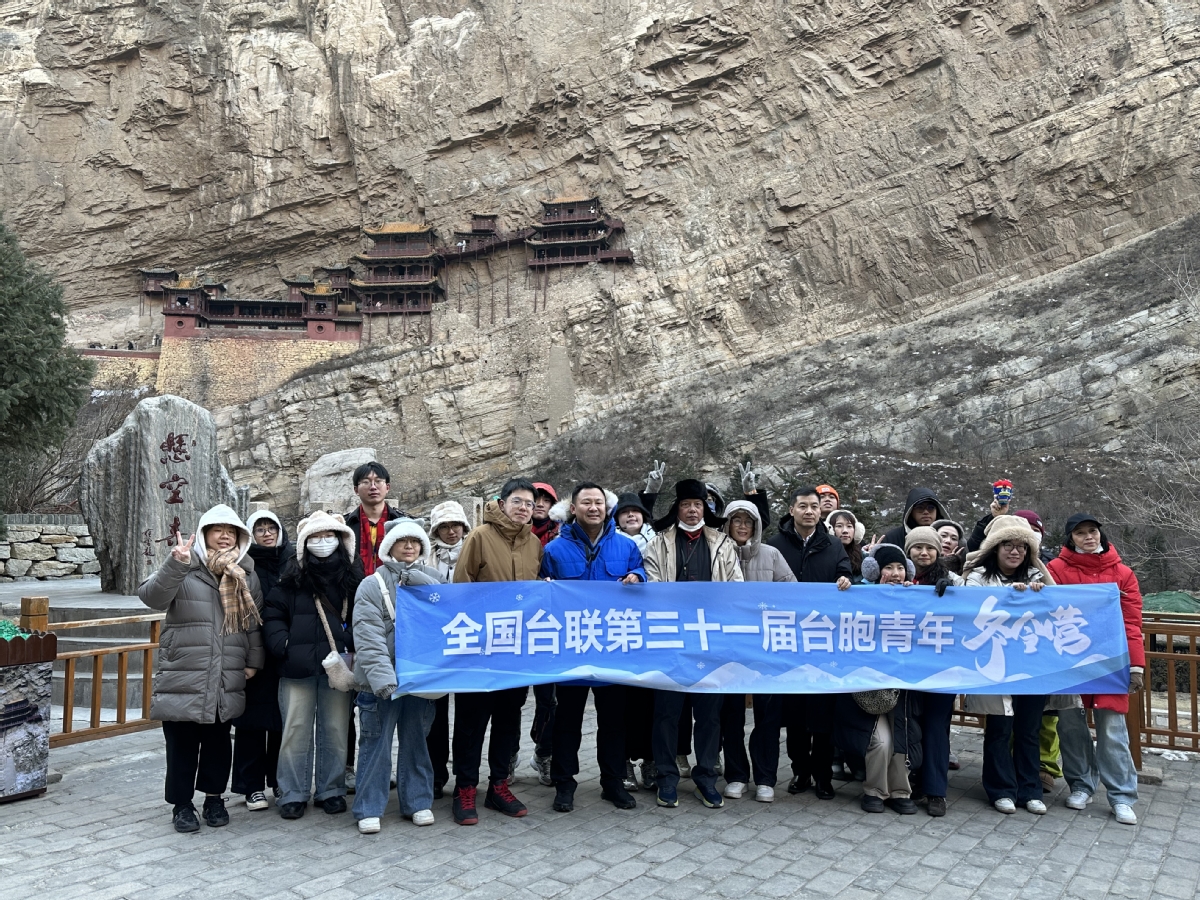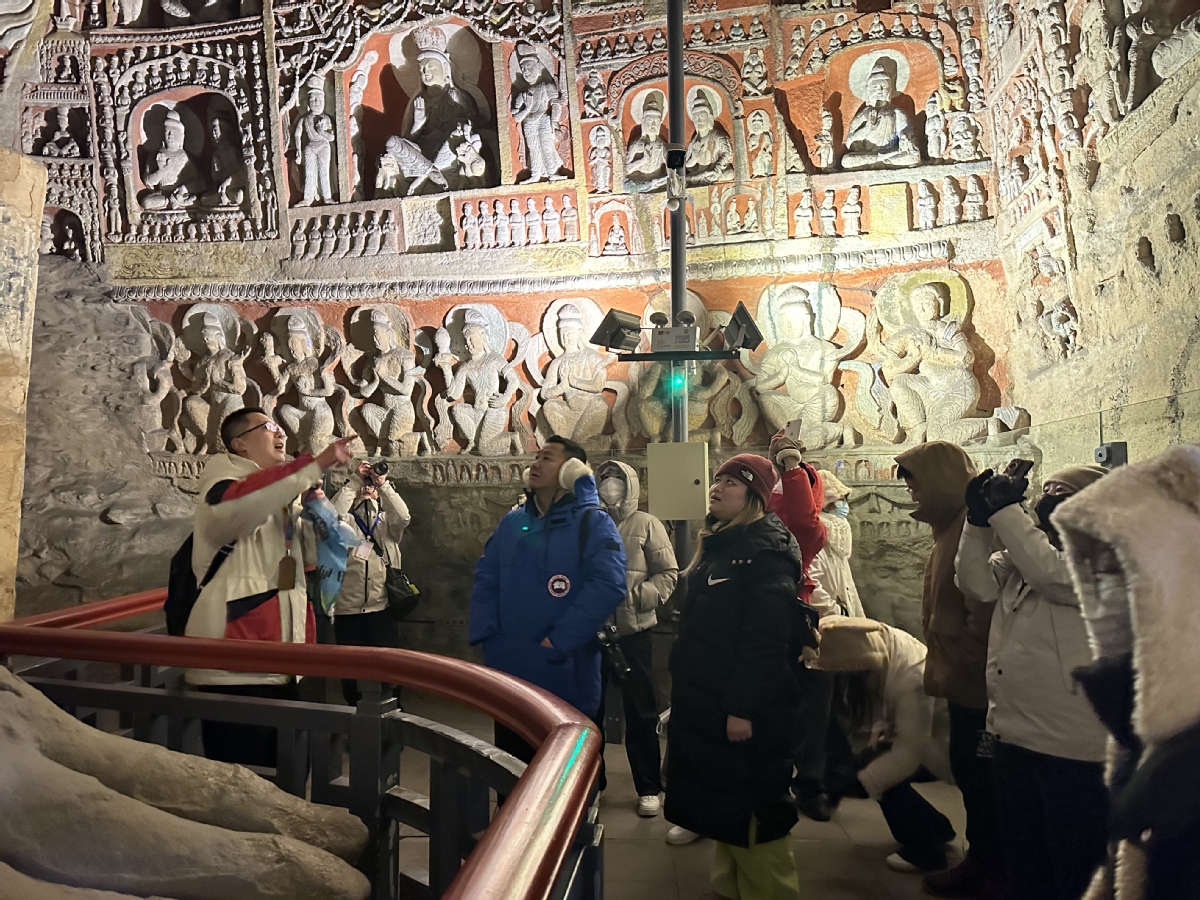
Young people from Taiwan participating in a winter camp on the Chinese mainland visited the Hanging Temple in Shanxi province. Zhang Yi / China Daily
Young people from Taiwan participating in a winter camp on the Chinese mainland say their visits to historical and cultural sites have enhanced their national confidence and provided insights into many aspects of history that have been downplayed in Taiwan.
Organized by the All-China Federation of Taiwan Compatriots, the activity has attracted about 1,000 young Taiwan people this year, the majority of whom are university students. More than half of them are visiting the mainland for the first time.
The winter camp spans 17 provincial regions and offers a diverse range of activities. Around 20 young people from Taiwan visited Datong and Taiyuan in Shanxi, a province known for its wealth of historical landmarks. The popularity of Shanxi's ancient architectural sites, which served as scene locations for the domestically produced game Black Myth: Wukong, has drawn a large number of tourists since last year.
"This is a well-made game about Chinese culture that is also popular in Vietnam. I often watch livestreams of this game," said Liao Chung-ming, a 24-year-old from Taiwan who is currently working in Vietnam.
He was visiting Shanxi with his Vietnamese girlfriend.
While visiting one of the scene locations, the Hanging Temple in Shanxi, Liao said he felt the game's depiction was beautiful and highly accurate.
His girlfriend, visiting China for the first time, specifically bought a cartoon pendant of Sun Wukong, as she learns that the monkey is a childhood idol for every Chinese boy. She plans to use it as a car decoration for her father.

Young people from Taiwan visit the Yungang Grottoes in Shanxi province. Zhang Yi / China Daily
After visiting the Foguang Temple and Nanchan Temple in Shanxi — among the few surviving Tang Dynasty (618-907) temple buildings in China — An Wei-lun, a student from Taiwan studying at Peking University, said he learned about the architectural structures and the statues of Buddhas inside, and he gained insight into the development of the Chinese nation with its rich cultural heritage.
"I can see the cultural confidence of the Tang Dynasty a thousand years ago," he said.
Despite learning about the history of the temples in classrooms, he said that he was truly moved when he visited the sites and saw the buildings himself, adding that it was then that he grasped the abundance of historical and cultural heritage in the country.
In Shenyang, Liaoning province, a group of Taiwan compatriots visited the 9.18 Historical Museum. After witnessing the mass graves and remains of martyrs who were brutally slaughtered by the Japanese army in Northeast China, they expressed shock and emphasized the importance of remembering history.
The September 18th Incident, also known as the Mukden Incident, occurred on Sept 18, 1931. It was a staged event orchestrated by the Japanese army to create a pretext for Japan's invasion of Northeast China. It marked the beginning of Japanese military aggression against China.
"Without the sacrifices of the martyrs, there would be no peaceful era we enjoy today," said Yang Shang-chieh, a youth from Taiwan. He noted that Taiwan's curriculum guidelines have omitted many aspects of the War of Resistance Against Japanese Aggression (1931-45), suggesting that the Taiwan authorities aim to manipulate people by deceiving them.
Wu Chien-yi, a teacher from Taiwan, highlighted the positive educational role of the 9.18 Historical Museum. She expressed hope that this visit would help Taiwan students better understand the history of the Chinese nation and recognize their historical responsibilities as Chinese.
The winter camp also featured ice and snow sports, experiences of New Year customs, and tours focused on modern China's development.
Zheng Jianmin, president of the All-China Federation of Taiwan Compatriots, said many Taiwan compatriots have witnessed firsthand the rapid development and transformation of the country, finding opportunities to realize their dreams on the mainland.
He expressed hope that young people from both sides would cultivate lasting friendships through interactions at the winter camp.
Since its establishment in 1989, the camp has attracted more than 8,000 youths from Taiwan.